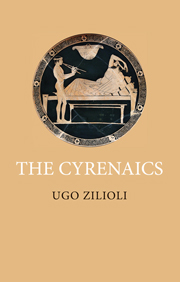Appendix: Cyrenaic testimonies in translation
Summary
I list the sources and testimonies on the Cyrenaics in translation in alphabetical order of the authors. The title of the work from which the passage is quoted is bracketed. The corresponding testimony in Giannantoni's Socratis et Socraticorum Reliquiae, if available, is indicated at the end of the passage.
THE ANONYMOUS THEAETETUS COMMENTATOR
1. “Something is the agent [to poiēsan], something else is the patient [to paschon]. But, if people undergo affections that are opposed to the thing in itself, they will agree that the intrinsic feature of the agent is not defined [mē einai hōrismenēn tēn tou poiēsantos idiotēta]; if it were so, the same thing at the same time will not produce different affections. Because of this, the Cyrenaics say that only affections are apprehensible [mona ta pathē phasin katalēpta], while external things are not [ta de exōthen akatalēpta]. That I am being burnt – they say – I apprehend; that the fire is such as to burn is obscure. If it were such, all things will be burnt by it” (col. LXV, 19-35=SSR IV A 214).
ARISTOCLES AND EUSEBIUS
From Eusebius, Preparation for the Gospel
2. “Aristippus from Cyrene maintains that the end of good things is pleasure, of bad things pain [telos agathōn tēn ēdonēn, kakōn de tēn algēdona]; he rejects all the other sciences of nature, saying that the only useful thing to do is to look for what is good and bad” (Euseb. Praep. evang. 1.8.9=SSR IV A 166).
- Type
- Chapter
- Information
- The Cyrenaics , pp. 185 - 196Publisher: Acumen PublishingPrint publication year: 2012



